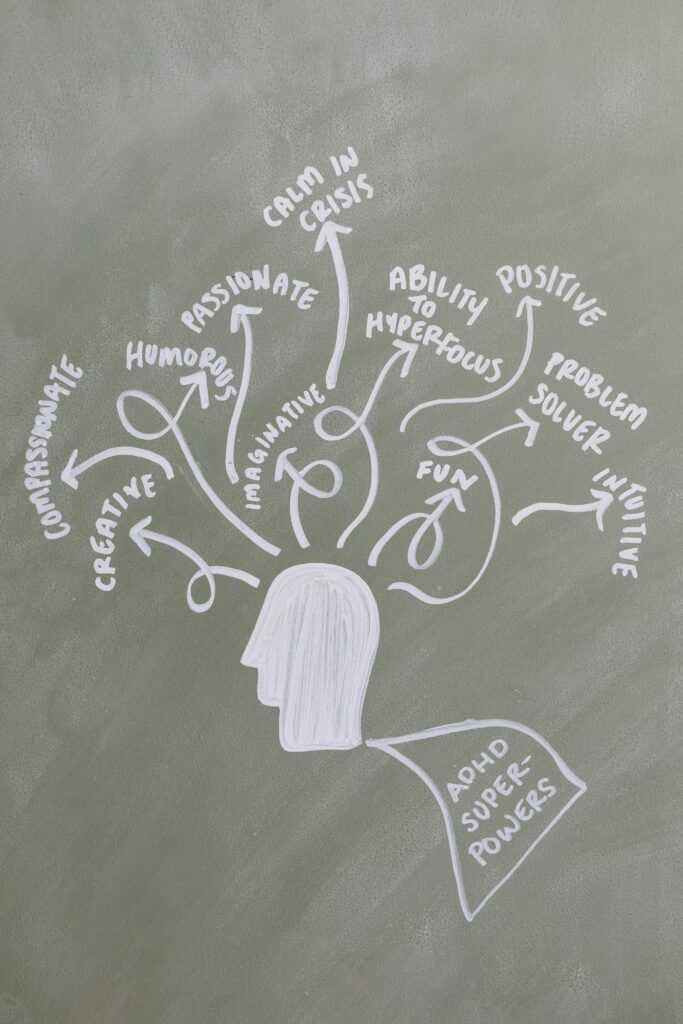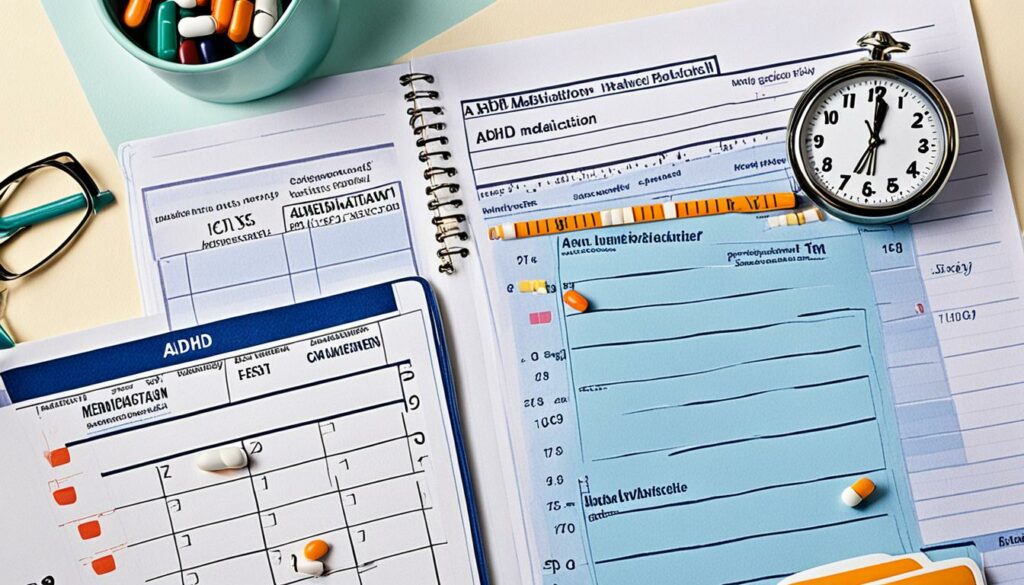
Have you ever wondered if those occasional lapses in concentration, or the frequent feelings of restlessness you experience, might point to something greater? Across various life domains, undetected signs you might have ADHD as an adult can manifest subtly, cloaked in attributes labelled as ‘quirky’ or ‘absent-minded’. Yet, they cast a longer shadow than many realise, often carrying the weight of adult ADHD symptoms. Moving beyond mere daydreaming and last-minute rushes, these nuances in behaviour may not just be harmless eccentricities—a deeper understanding could reveal a neurological basis for these challenges.
Adult Attention-Deficit/Hyperactivity Disorder is a mental health condition that doesn’t always resign after childhood. In many cases, symptoms evolve, and hyperactivity might retreat into the background, ushering in struggles with impulse control and consistent focus. It can destabilise organisation and time management, leading to frayed commitments and boundless frustration. What’s more, this can coincide with mental health issues like depression and anxiety, adding layers of complexity to daily living and overall well-being.
Key Takeaways
- Recognising the less overt signs of adult ADHD can aid in identifying the condition in your daily life.
- ADHD doesn’t just affect children; adult symptoms differ and often include challenges with organisation and impulse control.
- Hyperactivity in adults may diminish over time, but inattentiveness and impulsivity can persist or evolve.
- Knowing the signs you might have ADHD as an adult can be the first step towards seeking the help needed to manage the condition effectively.
- A comprehensive understanding of adult ADHD symptoms is crucial for distinguishing between occasional distractions and a possible underlying health issue.

Understanding Adult Attention Deficit Hyperactivity Disorder
The journey through life for individuals with adult attention deficit hyperactivity disorder (ADHD) can be fraught with many challenges traditionally considered to be child-related concerns. Yet, the reality is that ADHD symptoms often persist into adulthood, presenting a constellation of signs that can significantly impede daily functioning and overall well-being.
The Nature of ADHD in Adults
Contrary to common belief, ADHD does not simply vanish with age. The disorder continues to affect many adults, although the symptoms may undergo subtle transformations. Hyperactivity, a hallmark of the condition in childhood, tends to manifest in adulthood as restlessness, while the core issues of prolonged attention deficits and impulsivity remain prevalent. Recognising the signs of adult ADHD is pivotal not only for personal understanding and self-awareness but also for obtaining appropriate professional support.
Distinguishing Adult ADHD from Childhood Onset
Those familiar with ADHD symptoms in adulthood often note a decrease in overt hyperactivity; however, this does not negate the presence of the disorder. Adults may experience ADHD as an ongoing struggle with time management, organisational skills, and frustration tolerance. This often results in a rippling effect, influencing relationships, professional life, and academic pursuits negatively.
Manifestations and Impact on Daily Life
Identifying the signs of adult ADHD is an intricate process, as such symptoms intertwine with the demands of adult life. The disorder can ripple through one’s personal and professional spheres, often culminating in an array of difficulties, from maintaining relationships to managing responsibilities at the workplace.
| Manifestation | Impact on Daily Life |
|---|---|
| Impaired Time Management | Missed deadlines, late arrivals, and a pervasive sense of being overwhelmed. |
| Difficulty Multitasking | Increased errors, uncompleted tasks, and declining productivity. |
| Low Frustration Tolerance | Stress in personal relationships, frequent career transitions, and educational setbacks. |
| Restlessness | Constant need for movement, leading to disruptions in quiet settings or professional environments. |
Addressing adult attention deficit hyperactivity disorder signs is crucial as it aids in nudging individuals towards seeking help, quelling the frequently unrecognised tumult beneath their daily experiences. Through this understanding, adults with ADHD can begin to navigate a pathway to management, tailored interventions, and an enhanced quality of life.

Common Misconceptions About Adult ADHD
When discussing the reality of ADHD signs in adults, it’s essential to dispel prevalent myths that contribute to misunderstandings about the condition. Far beyond the narrow view of hyperactivity, ADHD in adulthood presents a spectrum of symptoms that can significantly affect one’s day-to-day life.
Debunking the Myths: ADHD Beyond Hyperactivity
ADHD in adulthood involves a complex array of behaviours and challenges that commonly go unnoticed due to the stereotypes surrounding the condition. The influence of these misconceptions can lead to underdiagnosis or misdiagnosis, as many symptoms are often mistaken for personal character flaws or overlooked entirely. Recognising the severity and persistence of signs of ADHD in adulthood is critical for an accurate assessment of this neuropsychiatric condition.
Normal Behaviour vs ADHD-Related Actions
It’s commonplace for adults to experience moments of forgetfulness or distraction, but it is the frequency and impact of these occurrences that distinguish ADHD symptoms in adults from normal variations in behaviour. Diagnostic accuracy is vital, as similar traits may arise from a myriad of other conditions, such as stress or sleep deprivation. To distinguish these, professionals conduct thorough evaluations, considering various aspects of an individual’s history and present concerns.
| Behaviour | Typical Adult Actions | ADHD-Related Actions |
|---|---|---|
| Attention | Occasional lapses due to multi-tasking or fatigue | Chronic inattentiveness disrupting all spheres of life |
| Impulsivity | Spontaneous decisions made occasionally | Routine impulsiveness leading to negative consequences |
| Organisation | Mild disorganisation with limited impact | Significant disorganisation affecting job performance and relationships |
| Hyperactivity | Situational restlessness or nervous movements | Persistent need for movement and inability to remain still |
In light of these insights, it’s evident that a nuanced understanding and recognition of adhd symptoms in adults are crucial for fostering support and providing effective interventions tailored to the needs of adults living with ADHD.
Signs you might have adhd as an adult
Attention Deficit Hyperactivity Disorder (ADHD) isn’t just a childhood concern; it can present significant challenges for adults too. If you’re questioning whether the difficulties you face align with the signs and symptoms of adult ADHD, it’s beneficial to understand the core manifestations, which primarily encompass inattentiveness, hyperactivity, and impulsivity.
Indicators of Inattentiveness
Adults with ADHD often find that their mind seems to have a will of its own, flitting from task to task without completion. Signs manifest as consistent distractions, the inability to follow detailed instructions or even the simple misplacement of keys and wallets, which can be more than just casual forgetfulness.
Recognizing Hyperactive Behaviours
Hyperactivity in adults may not be as noticeable as with children; it’s less about overt movements and more about a pervasive sense of inner restlessness. This could mean a chronic need for activity or change, often leading to a disorganised lifestyle.
Understanding Impulsivity in Adults
Impulsivity is a tell-tale sign when pondering if you may exhibit signs you might have ADHD as an adult. Rash decision-making, a pattern of interrupting conversations, or a sudden disinterest in tasks that require a concerted effort for long periods, all underscore the typical impulsive nature of ADHD.
Recognising these behavioural patterns in oneself can be the first step towards seeking the appropriate support and intervention. The journey may not be straightforward, but understanding your symptoms can guide you to manage effectively the vibrant, albeit sometimes hectic, life that comes with ADHD.
Could Your Daily Struggles Indicate ADHD?
As you consider your everyday challenges, it’s worth pondering if they might be indicative of adult attention deficit hyperactivity disorder (ADHD). Common hurdles such as chronic disorganisation and poor time management can often be mistaken for mere personality traits or the product of a busy lifestyle. Yet, they could very well be ADHD signs in adults. Recognising these signs is the first step towards seeking appropriate support and making positive changes to enhance your quality of life.
Chronic Disorganisation and Time Management Woes
If you frequently find yourself at the mercy of misplaced items, missed deadlines, or a cluttered workspace, these are not just signs of a hectic life; they may also be signs of adult attention deficit hyperactivity disorder. An inability to establish a structured routine or maintain order can significantly impact various aspects of life, from professional achievements to personal relationships.
Patterns of Incomplete Projects and Missed Appointments
For adults grappling with ADHD, a pattern of starting projects with enthusiasm but then struggling to see them through is common. Additionally, forgotten appointments or social engagements can be more than a mere oversight; they could be symptomatic of deeper attentional issues. Tracking these patterns and understanding their implications is essential for adults contemplating whether ADHD plays a role in their lives.
Beneath these challenges lies a wealth of potential. Prompt recognition and proactive management of these signs can lead to a more controlled and rewarding life. Consider the following table that summarises typical struggles faced by adults suspecting ADHD:
| Daily Challenge | Associated with ADHD | Impact on Life |
|---|---|---|
| Disorganisation at Home and Work | Yes | Leads to stress, lowered productivity |
| Procrastination on Key Tasks | Yes | Results in missed deadlines, guilt |
| Difficulty Prioritising Effectively | Yes | Causes strain on personal/professional relationships |
| Forgetting Important Appointments | Yes | Creates trust issues, disarray in personal agenda |
In combing through daily struggles that align with ADHD signs in adults, it becomes clear that these are not standalone experiences but interconnected symptoms that affect overall life management. Recognising these as potential adult attention deficit hyperactivity disorder signs can be a transformative step towards change.
The Overlooked Emotional Aspects of Adult ADHD
Whilst the common portrayal of adult ADHD often spotlights challenges like distractions or hyperactivity, it’s the emotional layers that can silently shape the realities of those affected. The myriad of feelings—from swift mood swings to the overwhelming currents of stress—casts a significant shadow over the condition, begging for an equal stance in discussions about ADHD signs in adults and ADHD symptoms in adults. Emotional regulation, scarcely discussed, is one of these pivotal areas, playing a crucial backdrop to the practical day-to-day hurdles.
Adult ADHD and Its Connection to Mood Swings
The erratic wave of emotions can be as debilitating as any physical manifestation of ADHD. Adults grappling with the condition may find themselves in the grips of abrupt and intense mood swings, swinging from peaks of irritation to troughs of disheartenment, often without visible cause. These unexpected emotional pivots can strain personal and professional bonds, compounding the misapprehensions surrounding adhd signs in adults.
Coping with Stress and ADHD-Related Emotional Challenges
The endeavour to manage the intricacies of adult ADHD inadvertently heightens stress levels. The interplay between heightened stress and ADHD symptoms in adults results in a challenging emotional climate that demands resilience and understanding. Strategies developed to cope with these unique challenges are not one-size-fits-all; they must be catered to each individual’s experiences and capacities, creating a scaffold for emotional stability amidst the storms of ADHD.
Risk Factors and Causes of ADHD in Adults
Identifying the factors that contribute to the onset of ADHD symptoms in adults is crucial for understanding and managing this condition. Recognised risk factors are found across genetic, environmental, and developmental domains, presenting a complex interaction that affects individuals differently.
Genetics and ADHD: Is it in Your Family?
Genetic factors exert a considerable influence on the propensity for developing ADHD. Research indicates a hereditary trend, with the condition being more common in people who have relatives with ADHD. This suggests a strong genetic component that merits consideration when assessing signs of ADHD in adulthood.
Environmental Influences and Developmental Concerns
Environmental factors play a pivotal role in the development of ADHD symptoms in adults. Exposures to harmful substances during childhood or fetal development, such as lead and parental use of alcohol or tobacco, are associated with increased risks of ADHD. Additionally, disruptions in development involving the central nervous system may lay the groundwork for the emergence of ADHD symptoms in adults. Understanding these elements can aid in recognising potential adhd symptoms in adults and gauging the overall likelihood of a diagnosis.

When Should You Seek Professional Advice?
Recognising the signs of ADHD in adults can be life-changing. It is essential for those who notice persistent adhd symptoms in adults that impact their daily lives to seek professional advice. Acknowledging the need for a medical assessment could be the first step towards receiving the support necessary to manage the condition effectively.
Self-Assessment vs. Medical Evaluation
While self-assessment can offer initial insights into one’s behavioural patterns, it is no substitute for a professional diagnosis. ADHD has various overlapping symptoms with other conditions, and only a qualified healthcare provider can differentiate these effectively.
Finding the Right Health Care Professional
Choosing a healthcare professional experienced in adult ADHD is crucial. Look for experts who have demonstrated a profound understanding and a compassionate approach to treating ADHD in adults. A comprehensive evaluation will usually cover much more than a simple checklist of symptoms.
| Consultation Type | Key Components | Outcome |
|---|---|---|
| Initial Assessment | – Discussion of symptoms – Health and family history – Impact of symptoms on daily life | Understanding of individual challenges |
| Differential Diagnosis | – Psychological testing – Distinction from other mental health conditions | Clarification of ADHD diagnosis |
| Treatment Planning | – Personalised management strategies – Medication recommendations – Therapy options | A tailored plan for managing ADHD |
Treatment Approaches for Adults with ADHD
As adult ADHD can be a multifaceted challenge, treatment strategies are shaped to address the intricate patterns of adhd symptoms in adults. The management of adult ADHD symptoms encompasses a broad range of therapeutic modalities, each targeting specific aspects of the conditions. It is imperative to evaluate the benefits and limitations of each option to forge a bespoke treatment plan.
Medications and Their Role in Managing ADHD
Pharmacotherapy plays a pivotal role in mitigating the core symptoms of adult ADHD, with a range of medications at the disposal of healthcare professionals. Stimulants are commonly prescribed, proving effective in enhancing concentration and reducing impulsive actions. Nonstimulants offer an alternative, particularly for patients who may not respond well to stimulant medications. However, it is crucial that these treatments are closely supervised to manage side effects and to ensure medication adherence.

Psychotherapy Options for Improved Coping Skills
In conjunction with medication, psychotherapy stands as a robust pillar in the treatment framework for adults living with ADHD. Cognitive-behavioural therapy (CBT) and other psychotherapeutic interventions furnish individuals with strategies to better organise their lives, prioritise tasks, and manage time more effectively. Additionally, these therapies can enhance social skills, improve self-esteem, and foster a more structured approach to tackling everyday challenges linked with adult ADHD symptoms.
Each therapeutic journey is personalised, taking into account unique lifestyle factors, coexisting conditions, and the individual’s specific set of symptoms. Ensuring a holistic approach not only alleviates the symptoms but also fortifies the individual’s resilience, paving the way to a more balanced and productive life.
Coexisting Conditions: ADHD and Other Mental Health Issues
Adults grappling with the challenges of adult attention deficit hyperactivity disorder often find themselves navigating an intricate web of coexisting mental health issues. Identifying these overlapping symptoms can be a complex process but is essential for effective treatment and management. It’s not uncommon for adhd symptoms in adults to overlap with other psychiatric conditions, thereby necessitating an integrated approach to care.
Evaluating Mood and Anxiety Disorders Alongside ADHD
Both mood and anxiety disorders can present alongside ADHD, often clouding the diagnostic picture. Depression, exhibited through persistent feelings of sadness and a lack of interest in daily activities, frequently occurs in tandem with the signs of adult attention deficit hyperactivity disorder. Bipolar disorder, characterised by dramatic mood swings from mania to depression, can also appear in adults with ADHD. Anxiety disorders, typified by incessant worry and tension, may not only coexist but also intensify ADHD’s symptomatic framework.
The Complexity of Treating ADHD with Concurrent Conditions
When addressing the treatment of adults with ADHD, clinicians must navigate the additional complexity introduced by concurrent mental health conditions. An illustrative table below showcases the intersection of ADHD with these conditions and the multifaceted nature of treatment strategies:
| Condition | ADHD Symptoms | Coexisting Symptoms | Integrated Treatment Approach |
|---|---|---|---|
| Depression | Difficulty in concentrating, restlessness | Persistent sadness, loss of interest | Combined medication regimens, psychotherapy |
| Bipolar Disorder | Impulsiveness, agitation | Mood swings, periods of mania and depression | Mood stabilisers, cognitive behavioural therapy |
| Anxiety Disorders | Hyperactivity, inattention | Excessive worry, nervousness | Anti-anxiety medications, relaxation techniques |
An exhaustive assessment that understands the overlap between adhd symptoms in adults and additional psychiatric conditions is key to a successful, individualised treatment plan. This often involves a combination of pharmacological and non-pharmacological interventions designed to address both the symptoms of adult attention deficit hyperactivity disorder and the particularities of the coexisting conditions.
Living with ADHD: Strategies for Adults
Recognising adhd symptoms in adulthood is merely the first step; developing strategies to manage them effectively is crucial for improving daily life. Adults diagnosed with ADHD can engage in several proactive approaches to navigate their symptoms more smoothly and maintain a well-balanced lifestyle.

Organisation and Time Management Techniques
Effective time management and organisation can be especially challenging for those displaying signs you might have adhd as an adult. However, by adopting robust strategies to structure their environment, adults with ADHD can achieve remarkable differences in productivity and stress reduction.
| Technique | Description | Benefit |
|---|---|---|
| Task Segmentation | Breaking down tasks into smaller, manageable steps | Reduces overwhelm and clarifies the next action points |
| Prioritisation | Identifying and focusing on tasks with the highest importance | Ensures critical tasks are completed, preventing crises |
| Use of Planners | Implementing organisational tools such as digital apps or physical diaries | Keeps track of commitments and helps with future planning |
| Time Blocking | Dedicating specific time blocks for focused work | Creates a routine and reduces the attraction of distractions |
Building Relationship Skills and Effective Communication
Positive interpersonal relationships are a cornerstone of adult life, but they can be impacted by the symptoms of ADHD. Enhancing communication and relationship skills can significantly assist in formulating and maintaining stronger connections.
- Active Listening: Focusing wholeheartedly on what others are saying is crucial. It fosters understanding and reduces misunderstandings.
- Clear Communication: Conveying thoughts and feelings assertively, avoiding a passive or aggressive stance, helps in forming mutually respectful relationships.
- Patient Responses: Taking a moment before reacting can prevent impulsive responses that might hurt relationships.
- Conflict Resolution Skills: Learning to address disagreements constructively prevents them from escalating and harming the relationship.
Integrating these strategies into one’s life can notably ease the daily experiences of adults with ADHD, opening up paths to both personal and professional success.
Support and Resources for Adults Suspecting ADHD
Recognising the potential adhd signs in adults can be the first step towards getting the support and resources necessary for managing this condition. Awareness of adult adhd symptoms is crucial in seeking early intervention, which can lead to improved outcomes and quality of life.
For adults beginning to question whether their daily challenges might be attributed to ADHD, a structured approach to accessing support and resources is beneficial:
- Consulting with a medical professional who has experience in diagnosing and treating adult ADHD.
- Using online tools that aid in finding localised behavioural health treatment services.
- Researching treatment options and FDA-approved methodologies for managing ADHD symptoms effectively.
- Participating in support groups to connect with others experiencing similar challenges.
Here are further details on available supporting structures:
| Resource Type | Description | Benefits |
|---|---|---|
| Healthcare Professionals | Doctors, psychiatrists, and psychologists specialising in ADHD. | Personalised assessment and treatment plans, ongoing support. |
| Online Tools | Digital platforms like the Behavioural Health Treatment Services Locator. | Convenience in finding nearby services, anonymity if desired. |
| Informational Sources | FDA guidelines and latest research on ADHD treatment options. | Access to authoritative, up-to-date information. |
| Support Groups | Group gatherings with individuals sharing similar experiences. | Community support, shared experiences, and coping strategies. |
Effective management of ADHD is not about eliminating symptoms but rather improving functional abilities and quality of life. With a variety of resources at hand, adults suspecting ADHD can take proactive steps towards a better understanding and handling of their condition. Being part of a community, whether through professional channels or peer support, underscores that one does not have to navigate ADHD alone.
ADHD Across the Lifespan: From Recognition to Management
Attention-Deficit/Hyperactivity Disorder (ADHD) persists beyond the playground and into the boardroom, affecting adults worldwide. Grappling with the signs of ADHD in adulthood, individuals may face challenges such as interrupted focus, impulsiveness, and restlessness that echo through their personal and professional lives. However, the recognition and understanding of signs and symptoms of adult ADHD is the first stride towards effective management and an improved quality of life.

Living with undiagnosed ADHD can lead to various complications – difficulties in time management, strained relationships, and hindered productivity. It becomes imperative for adults who resonate with these experiences to seek out assessments, as an accurate diagnosis can open the door to a spectrum of supportive therapies and interventions designed for adult learning styles and responsibilities.
| Life Stage | Focus Area | Challenges | Management Strategies |
|---|---|---|---|
| Young Adulthood | Educational Pursuits | Time management, maintaining focus during studies | Structured schedules, study groups, academic accommodations |
| Midlife | Career Development | Workplace organisation, meeting deadlines | Professional coaching, organisation apps, delegation techniques |
| Later Life | Life Transitions | Adjusting to retirement, remaining actively engaged | Volunteering, part-time work, community classes |
While early detection of ADHD symptoms facilitates more immediate interventions, there is hope and guidance available for those who discover their ADHD later in life. Adults acquiring awareness about their ADHD condition can tap into a wealth of resources—ranging from medical treatments to cognitive behavioural therapies coupled with the support of a compassionate community. Navigating the complexities of ADHD with professional assistance can dramatically reshape the management of everyday demands, ultimately leading to a more balanced and fulfilling existence.
Conclusion
Gaining an in-depth understanding of adult ADHD symptoms empowers those affected to seek the professional support crucial for managing their condition. As we’ve explored the various facets of ADHD in adults, it’s pivotal to underscore that knowledge is a powerful ally. By recognising the signs you might have ADHD as an adult, individuals can take meaningful action towards improving their overall well-being.
Empowerment Through Knowledge and Professional Support
Indeed, knowledge equips one with the necessary tools to identify and confront the challenges presented by ADHD. With professional support, individuals can embark on a transformative journey to mitigate the disorder’s impact on daily life. It is through this synergy of informed awareness and expert guidance that those living with adult ADHD can forge a path to a more organised, productive life.
Moving Forward: The Path to Managing Adult ADHD
Taking proactive steps, such as procuring accurate diagnoses and embracing suitable treatments, can significantly enhance quality of life for those with adult ADHD. Adopting coping strategies and engaging with appropriate therapeutic interventions offer a solid foundation for progress. It’s a continuous process of learning and adjusting, but with the right resources and determination, managing adult ADHD becomes a tangible reality, leading to a more structured and rewarding existence.
FAQ
What are some signs you might have ADHD as an adult?
Adults with ADHD may experience difficulties in maintaining focus, frequent mind-wandering, and trouble in sticking with tasks. You might also be easily distracted, have poor time management skills, struggle with impulsivity, and display restlessness or emotional challenges such as mood swings and irritability.
How does adult ADHD differ from childhood onset ADHD?
While childhood ADHD is commonly characterised by overt hyperactivity, the adult form often manifests as restlessness and impulsiveness with less noticeable hyperactivity. Adults may struggle more with time management, organisational skills, and maintaining attention, rather than the physical hyperactivity often seen in children.
What are some common misconceptions about adult ADHD?
A prevalent misconception is that ADHD only involves hyperactivity. In reality, ADHD in adults includes a wider range of symptoms such as inattentiveness and impulsiveness. Moreover, not every instance of forgetfulness or distraction is due to ADHD; it is diagnosed based on the significant impact on daily life across multiple areas.
How can I recognise hyperactive behaviours as an adult with ADHD?
Hyperactive behaviours in adults tend to be subtler than in children. It might appear as an internal feeling of restlessness, constant need for activity, or difficulty relaxing. Adults with ADHD may feel driven by a motor and are often busy or doing many things at once.
Could chronic disorganisation and time management problems indicate adult ADHD?
Yes, these are common challenges for adults with ADHD. Difficulty in organising tasks, keeping schedules, managing time effectively, and frequently missing deadlines or appointments can all be signs of ADHD in adulthood.
What emotional aspects are associated with adult ADHD?
Adults with ADHD frequently experience mood swings, irritability, and may feel overwhelmed by stress more rapidly than others. They may also have a heightened response to emotional stimuli, leading to quick temper flare-ups or feelings of dissatisfaction.
What causes ADHD in adults?
The etiology of adult ADHD is multifactorial, including genetic, environmental, and developmental factors. A family history of ADHD can increase one’s risk, as well as certain environmental exposures during prenatal and early childhood development.
When should an adult consider a professional evaluation for ADHD?
If ADHD symptoms such as inattention, hyperactivity, or impulsivity are persistent and have a significant impact on daily functioning, it’s advisable to seek a professional evaluation. Professionals can differentiate between ADHD and other mental health issues that may have overlapping symptoms.
What treatment options are available for adults with ADHD?
Treatment for adults with ADHD typically includes medication, psychotherapy, or a combination of both. Medications can help manage symptoms such as impulsivity and inattention, while therapy can help individuals develop strategies to handle daily challenges and improve organisational skills.
How do other mental health issues intersect with adult ADHD?
Adults with ADHD often have co-occurring conditions such as mood disorders, anxiety, or depression. It’s important for healthcare providers to recognise and treat these alongside ADHD to ensure comprehensive care.
What strategies can help adults with ADHD manage their symptoms?
Organisation and time management techniques are crucial for adults with ADHD. Breaking tasks into smaller steps, using planners and reminders, prioritising responsibilities, and developing structured routines can be helpful. Building strong communication and relationship skills is also beneficial.
Where can adults who suspect they have ADHD find support and resources?
Adults can seek advice from medical professionals with ADHD expertise, use online resources like behavioural health treatment locators, and access information from trusted authorities such as the FDA. Support groups and therapy can provide additional assistance and community support.
Is it important to consider ADHD as a condition that can affect someone across their lifespan?
Absolutely. Recognising that ADHD is not just a childhood disorder but one that can continue into adulthood is vital for receiving appropriate support and treatment. Early identification and management can help, but even adults who recognise symptoms later in life can benefit from effective treatment strategies.
